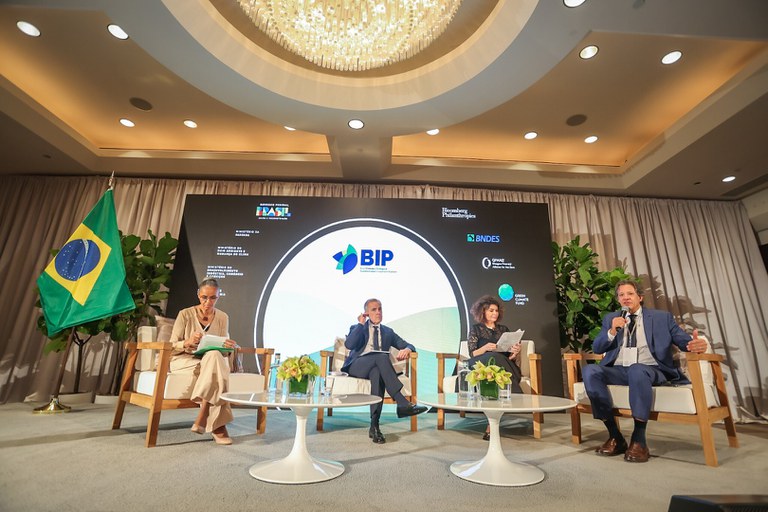Notícias
GREEN ECONOMY
Federal Government initiative to fund development, climate transition projects

This platform combines both the financing and the project. It will match the financier with applicants who have innovative ecological transformation projects,” explained Finance Minister Fernando Haddad - Credit: Diogo Zacarias/Ministério da Fazenda
On Tuesday, Oct. 22, in Washington, D.C., the Brazilian federal government launched an initiative to attract new funding for the country’s ecological transformation and climate transition projects. The Brazilian Platform for Investments in Climate and Ecological Transformation (Plataforma de Investimentos em Transformação Climática e Ecológica do Brasil, BIP) is led by the Ministry of Finance, in collaboration with the ministries of Environment and Climate Change; Mines and Energy; and Development, Industry, Trade, and Services. The platform is developed in partnership with Bloomberg Philanthropies, the Glasgow Financial Alliance for Net Zero (GFANZ), Brazil’s Development Bank (Banco Nacional de Desenvolvimento Econômico e Social, BNDES), and the Green Climate Fund (GCF).
The initiative aims to spur domestic investment by connecting international investors with strategic sustainable development projects in Brazil, focusing on ecological transition and climate change mitigation. “This platform integrates financing with project development. It will include all projects certified by BNDES as green projects. With BNDES certification, a project aligns with the Ecological Transformation Plan and is linked to various financing instruments. It matches financiers with applicants who have innovative projects in ecological transformation,” Finance Minister Fernando Haddad explained. “We are not alone—countries like Indonesia and Egypt are developing similar platforms, but Brazil is leading with the latest organizational advancements,” he added.
The minister cited that, prior to the platform, two initiatives alone—the Climate Fund and Eco Invest Brasil—mobilized BRL 10 billion and BRL 45 billion in resources, respectively. With the launch of the BIP, projects aimed at a fair and inclusive energy transition will gain even greater visibility. “This platform is likely to increase these figures, as sometimes there’s an investor without a project, or a project without an investor. We’re bridging this gap, including through external funding,” Haddad added.
DEVELOPMENT - In this way, the BIP will facilitate the promotion of business opportunities in the country, in the sectors of the so-called green economy, which will inject more resources into the economy, generating jobs and income, and accelerating Brazil's socio-economic development.
Projects added to the platform will be aligned with the Climate Plan, which will steer the country’s climate policy through 2035, outlining national strategies and sectoral plans for both mitigation and adaptation. They will also be guided by the Ecological Transformation Plan, which coordinates the green transition of Brazil’s economy, aiming to achieve net-zero greenhouse gas emissions by 2050.
This will result in the creation of an investment ecosystem focused on the agenda of adaptation and tackling climate change and economic transformation, valuing new possibilities such as the bioeconomy, the green economy, green reindustrialization, and, in the future, low-carbon agriculture.
“In this case, we are saying which projects make sense within an investment ecosystem that is coherent with the Climate Plan, with the ecological transformation plan, with the forest restoration plan, with all of the country’s plans. This will give investors a sense of security about what is being put forward as an investment possibility. There is also leverage on the part of the government and this creates synergy,” commented Mariana Silva, Minister of the Environment and Climate Change.
Mark Carney, UN Special Envoy for Climate Action and Finance and Co-Chair of GFANZ, attended the event and praised the project. “Brazil is setting an example to the world, showing how action on emissions can boost growth, spread prosperity, and create new, well-paid jobs. The Ecological Transformation Plan and the New Industry Brazil plan create clear priorities for action,” he stated. “Now, the BIP will bring together the public and private sectors with national and international institutions to overcome investment barriers and support an economy-wide transition.”
GUIDELINES - The Brazil Platform for Climate Investments and Ecological Transformation (BIP) is an initiative of the Brazilian government with the ambition of expanding private and public investments in the ecological transformation towards the decarbonization of the economy, the sustainable use of resources, and the improvement of the population's life quality.
The BIP is one of the results of the task force for Global Mobilization against Climate Change, an innovation brought by Brazil's G20 Presidency. One of the proposals is to promote the Brazilian Government's Ecological and Climate Transformation Plans, including climate transition plans in key sectors.
The platform will initially focus on three sectors: nature-based solutions and the bioeconomy; industry and mobility; and energy.
Objectives of the BIP
- Map and prioritize project pipelines aligned with the government's plans and identify mechanisms to scale them up, in partnership with relevant sectoral initiatives such as the Industrial Transition Accelerator Program (Programa Acelerador de Transição Industrial / ITA) Brazil, the Industrial Decarbonization Hub, the Hydrogen Hub, and the Brazilian Nature Investment Laboratory (Laboratório de Investimentos da Natureza do Brasil).
- Bring together a global community of investors and financiers from the public and private sectors, development finance institutions, and multilateral climate funds to expand the pool of domestic and international capital available for priority projects.
- Develop potential financing mechanisms and explore ways to enable the strategic and catalytic use of public capital to mobilize private investment, including partnerships with multilateral development banks and national development institutions.
- Bring forward private sector perspectives on political barriers to help unlock investments in priority sectors that require additional support.
- Help advance Brazil's development and climate finance priorities in its G20 and COP30 presidencies.

